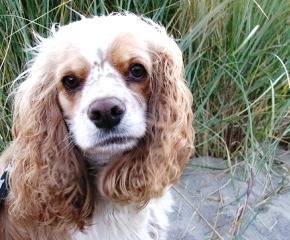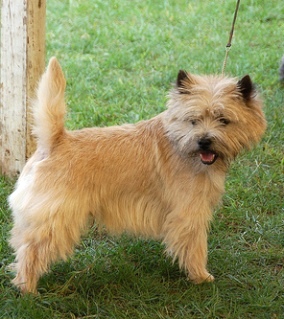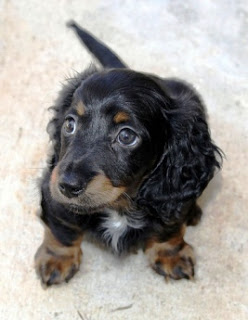Dogs
By Linda Cole
Deciding on the perfect name for a new puppy or dog isn't always easy to do. You want to pick one that fits his personality and is easy to learn. Now imagine coming up with a name for a new dog breed. The history of dog breeds is an interesting story. The history behind naming some of our popular dog breeds is also an intriguing tale.
Cocker Spaniel
Spaniels date back to the 14th century; they evolved over the years with some working on land and others working as water retrievers. These dogs were highly prized by English hunters for their outstanding ability to flush out and retrieve a large, short legged and bulky wading bird called a woodcock. This nocturnal bird spends most of the day hiding in dense cover. People started calling the dog “cocker,” and the name caught on.
Labrador Retriever
Newfoundland is the land of the Labrador Retriever, not Labrador. Fishermen around the Canadian province used a small water dog that was bred with Newfoundland dogs to produce a first-class swimmer called the St. John's Water Dog, the ancestor of the Labrador. The breed had webbed feet and was used to retrieve fishermen's nets from the icy waters and bring them back to shore. In the early 1800s, the Earl of Malmesbury saw one of the dogs in action and imported it to England. He trained his dogs to retrieve ducks and called them “Labrador dogs.” Even though the Earl was confused about which province his dogs came from, the name stuck as the dog became more popular.
Cairn Terrier
This little dog was developed on the Isle of Skye, in Scotland. Farmers wanted a small, feisty dog with lots of courage, determination, intelligence and the ability to go to ground when necessary after prey. The Cairn Terrier was bred to hunt badger, otter, fox, rabbit and other vermin. They were especially good at digging prey out from under cairns, which are mounds of man-made piles of stone used in the Scottish Highlands as grave site memorials and boundary markers. People started calling the dogs Cairn, and that's where the breed name came from.
Great Dane
This is one of the tallest dog breeds on Earth, affectionately referred to as the “Apollo of all breeds.” The Great Dane was developed in Germany and was likely created from mastiff type dogs, the Greyhound and the Irish Wolfhound. It was the French who named this breed, mistaking Denmark as the country of origin. In Germany, the dog is known as the Deutsche Dogge. A proper diet is very important for Great Danes, and it's essential to feed them a high quality food made especially for big dogs, such as the new CANIDAE Large Breed Formula.
Bouvier Des Flandres
This breed was developed in Flanders, which is located in northern Belgium, as an all-around farm dog to drive cattle, herd sheep, pull carts and act as a watchdog. French farmers were impressed with the working spirit of the dog and the breed name is French, meaning “Cow herder of Flanders.”
Beagle
This little dog has a distinct, resonant baying voice, which was how hunters were able to follow a pack of Beagles as they eagerly chased after prey. According to the Oxford English dictionary, the beagle word was first used in English writings in 1475. Where the word came from, however, is still a mystery. Beagle could have come from a French word “begueule” that means open throat, or a French, Old English or Celtic word “beag” which means little. Another possibility is a French word “beugler” which means to bellow, or a German word, “begele” which means to scold.
Dachshund
The Dachshund is an interesting breed, not only in looks, but in the job this small dog was bred to do. Don't let those short legs and long body fool you. When it comes to rooting out prey from underground, this breed is as feisty, determined, smart and capable as any dog. The breed was created in the early 1600s to work with hunters. Their job was to dig into badger holes and engage in combat with them. The dog was so good at doing his job, the breed was named in honor of his fearless spirit. Dachshund is a German word that means “badger dog.”
Weimaraner
Nicknamed the “Grey Ghost” because of his unique coat color, this breed was developed in the early 1800s at the Weimar court in Germany. Noblemen wanted a courageous hunting dog that was smart and fast, with plenty of stamina and good scenting ability to take on bear, wolves and deer. The breed name comes from the court he was developed in.
Cocker Spaniel photo by Jeremy McWilliams
Cairn Terrier photo by robinsend
Dachshund photo by Bill Kuffrey
Read more articles by Linda Cole
- Labrador Retriever History: Labs' Name And Shade Origin - Other
The breed of Labrador retriever distinctively stood up from practically 300 many different canine varieties with its multi-tasking skill. Labs are taken into consideration to be one particular of the most helpful puppy breeds that can be assigned to...
- Difference Between Parson, Jack Russell And Russell Terrier
By Linda Cole The Parson, Jack Russell, and Russell terriers are actually three different breeds, even though they're related and look much alike. The Russell Terrier was introduced at the National Dog Show in 2012 as a new breed recognized by the...
- Terrier Dog Breeds: Big Attitudes In Small Bodies
Airedale TerrierBy Linda Cole The terrier group of dog breeds is an interesting mix of canines, bred to do a variety of jobs from hunting prey to keeping rats at bay. They are feisty, energetic and small enough to fit into any home. This is a group with...
- The Dog Breeds Of Ireland
By Linda Cole I love digging into the history of dog breeds and where they originated. Our relationship with canines began centuries ago, and understanding the needs of our ancestors tells us we haven't really changed all that much in terms of how...
- The Most Affectionate Dog Breeds
By Linda Cole Dogs have been selectively bred with specific characteristics and temperaments that help them perform certain jobs for us. Some breeds, however, are known to be more affectionate than others. I wrote an article recently on why dogs like...
Dogs
How Some Popular Dog Breeds Got Their Name
 |
| Cocker Spaniel |
Deciding on the perfect name for a new puppy or dog isn't always easy to do. You want to pick one that fits his personality and is easy to learn. Now imagine coming up with a name for a new dog breed. The history of dog breeds is an interesting story. The history behind naming some of our popular dog breeds is also an intriguing tale.
Cocker Spaniel
Spaniels date back to the 14th century; they evolved over the years with some working on land and others working as water retrievers. These dogs were highly prized by English hunters for their outstanding ability to flush out and retrieve a large, short legged and bulky wading bird called a woodcock. This nocturnal bird spends most of the day hiding in dense cover. People started calling the dog “cocker,” and the name caught on.
Labrador Retriever
Newfoundland is the land of the Labrador Retriever, not Labrador. Fishermen around the Canadian province used a small water dog that was bred with Newfoundland dogs to produce a first-class swimmer called the St. John's Water Dog, the ancestor of the Labrador. The breed had webbed feet and was used to retrieve fishermen's nets from the icy waters and bring them back to shore. In the early 1800s, the Earl of Malmesbury saw one of the dogs in action and imported it to England. He trained his dogs to retrieve ducks and called them “Labrador dogs.” Even though the Earl was confused about which province his dogs came from, the name stuck as the dog became more popular.
 |
| Cairn Terrier |
This little dog was developed on the Isle of Skye, in Scotland. Farmers wanted a small, feisty dog with lots of courage, determination, intelligence and the ability to go to ground when necessary after prey. The Cairn Terrier was bred to hunt badger, otter, fox, rabbit and other vermin. They were especially good at digging prey out from under cairns, which are mounds of man-made piles of stone used in the Scottish Highlands as grave site memorials and boundary markers. People started calling the dogs Cairn, and that's where the breed name came from.
Great Dane
This is one of the tallest dog breeds on Earth, affectionately referred to as the “Apollo of all breeds.” The Great Dane was developed in Germany and was likely created from mastiff type dogs, the Greyhound and the Irish Wolfhound. It was the French who named this breed, mistaking Denmark as the country of origin. In Germany, the dog is known as the Deutsche Dogge. A proper diet is very important for Great Danes, and it's essential to feed them a high quality food made especially for big dogs, such as the new CANIDAE Large Breed Formula.
Bouvier Des Flandres
This breed was developed in Flanders, which is located in northern Belgium, as an all-around farm dog to drive cattle, herd sheep, pull carts and act as a watchdog. French farmers were impressed with the working spirit of the dog and the breed name is French, meaning “Cow herder of Flanders.”
Beagle
This little dog has a distinct, resonant baying voice, which was how hunters were able to follow a pack of Beagles as they eagerly chased after prey. According to the Oxford English dictionary, the beagle word was first used in English writings in 1475. Where the word came from, however, is still a mystery. Beagle could have come from a French word “begueule” that means open throat, or a French, Old English or Celtic word “beag” which means little. Another possibility is a French word “beugler” which means to bellow, or a German word, “begele” which means to scold.
 |
| Dachshund puppy |
The Dachshund is an interesting breed, not only in looks, but in the job this small dog was bred to do. Don't let those short legs and long body fool you. When it comes to rooting out prey from underground, this breed is as feisty, determined, smart and capable as any dog. The breed was created in the early 1600s to work with hunters. Their job was to dig into badger holes and engage in combat with them. The dog was so good at doing his job, the breed was named in honor of his fearless spirit. Dachshund is a German word that means “badger dog.”
Weimaraner
Nicknamed the “Grey Ghost” because of his unique coat color, this breed was developed in the early 1800s at the Weimar court in Germany. Noblemen wanted a courageous hunting dog that was smart and fast, with plenty of stamina and good scenting ability to take on bear, wolves and deer. The breed name comes from the court he was developed in.
Cocker Spaniel photo by Jeremy McWilliams
Cairn Terrier photo by robinsend
Dachshund photo by Bill Kuffrey
Read more articles by Linda Cole
- Labrador Retriever History: Labs' Name And Shade Origin - Other
The breed of Labrador retriever distinctively stood up from practically 300 many different canine varieties with its multi-tasking skill. Labs are taken into consideration to be one particular of the most helpful puppy breeds that can be assigned to...
- Difference Between Parson, Jack Russell And Russell Terrier
By Linda Cole The Parson, Jack Russell, and Russell terriers are actually three different breeds, even though they're related and look much alike. The Russell Terrier was introduced at the National Dog Show in 2012 as a new breed recognized by the...
- Terrier Dog Breeds: Big Attitudes In Small Bodies
Airedale TerrierBy Linda Cole The terrier group of dog breeds is an interesting mix of canines, bred to do a variety of jobs from hunting prey to keeping rats at bay. They are feisty, energetic and small enough to fit into any home. This is a group with...
- The Dog Breeds Of Ireland
By Linda Cole I love digging into the history of dog breeds and where they originated. Our relationship with canines began centuries ago, and understanding the needs of our ancestors tells us we haven't really changed all that much in terms of how...
- The Most Affectionate Dog Breeds
By Linda Cole Dogs have been selectively bred with specific characteristics and temperaments that help them perform certain jobs for us. Some breeds, however, are known to be more affectionate than others. I wrote an article recently on why dogs like...
